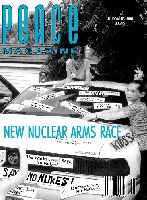
Peace Magazine Jul-Aug 1998, page 27. Some rights reserved.
Search for other articles by Franklyn Griffiths here
The CANDU MOX initiative is a Canadian proposal to assist the Russian Federation and the United States in relieving themselves of a combined amount of up to 150 tonnes of weapons plutonium. This material has been rendered excess to the defence needs of the two countries as a result of the end of the Cold War and various nuclear arms reduction agreements. The proposal originates with the Canadian nuclear industry. It would have Russia and the U.S. each blend some of their weapons plutonium, amounts yet to be determined, in oxide form with uranium oxide, and to send the mixed oxide (MOX) as nuclear reactor fuel to Canada. There it would be irradiated to produce electricity in CANDU reactors at the Bruce nuclear generating station on the shore of Lake Huron about 300 km north of Detroit over a period of up to 25 years, and then held in Ontario in the form of spent reactor fuel forever. The MOX initiative is presented as a swords-into-ploughshares venture that would first convert megatonnes of destructive potential into megawatts of socially useful electricity, and then secure the waste in Canada in perpetuity so that the plutonium remaining in it could never be used again for military purposes by the two principals, or be diverted to potential nuclear-weapons states or terrorist organizations.
The CANDU MOX initiative has the informal backing but not the firm support of the Canadian government. Ottawa is assessing the international and national value of the undertaking before it decides whether or not to commit firmly to the proposal. Plutonium, with its immense radioactive longevity and carcinogenic quality, cannot be "disposed of" for here the term "disposition" refers to the moving of plutonium from one place to another but not actually getting rid of it.
The Canadian government should refuse to support the CANDU MOX initiative any longer and consign it to oblivion. If the initiative is implemented, it would impose direct and substantial security, safety, financial, and governance costs on Canadians and particularly on Ontarians. The nuclear non-proliferation and nuclear disarmament benefits of the initiative, which are presented as its principal advantages, are woefully inadequate. When implementation of the CANDU MOX initiative is not ineffective for purposes of nuclear non-proliferation, it is actually counterproductive. As to nuclear disarmament, the initiative holds little or no promise of making the world a safer place when the Russian Federation and the United States are determined, as they are, to retain the potential to resurrect their Cold War strategic nuclear arsenals. An undertaking that would produce substantial direct costs to Canadians and would yield no offsetting benefits for peace and security is not in the public interest.
Canadian Interests
Giving careful consideration to the interplay of political, technological, and financial considerations among the leading Western states and the Russian Federation over excess weapons plutonium disposition, we find that the CANDU MOX initiative is a viable proposition when viewed solely in terms of its international negotiability. It is viable internationally mainly because Canadian-based reactor disposition offers part of the answer to Russia's lack of nuclear reactors that can be made safe for weapons MOX use. Not only would implementation of the CANDU MOX initiative be detrimental to Canadian interests, but the initiative could be taken up by the G-8 (which now includes Russia) as early as the end of 1998, if the United States were to hold to its decision to select from among its disposition options by that time.
Were the Canadian offer to be picked up, Canadians would absorb the direct costs of CANDU MOX implementation and would make an international contribution not so much to peace and security as to the smooth functioning of the G-8 as an institution. This would not be worth the cost.
If the CANDU MOX initiative is so inept and unfortunate as it stands, might it nevertheless be improved upon? When the Canadian government of the day has seen fit to give its informal backing to a poorly framed venture of the Canadian nuclear industry, there is little likelihood of Ottawa making the abrupt turnabout required to safeguard the initiative against its own inadequacies.
We therefore recommend that the CANDU MOX initiative be rejected outright by Canadians and rejected forthwith by the Canadian government. If the Canadian government opts instead to move forward with the initiative, a number of changes must be made to reduce the damage that would be done to Canadians and Ontarians, and to strengthen the initiative's potential to make an authentic contribution to international peace and security.
Key among these necessary changes is for the government to distance itself from the reactor preferences of the Canadian nuclear industry, do what it can for the immobilization option, and if that cannot be fully sustained, incorporate the underlying principles of immobilization into a vigorous resistance against the further spread of civil plutonium fuel-cycle technology.
Franklyn Griffiths is a peace studies professor. See PEACE's interview with him on pages 6 and 7 of this issue.

Peace Magazine Jul-Aug 1998, page 27. Some rights reserved.
Search for other articles by Franklyn Griffiths here